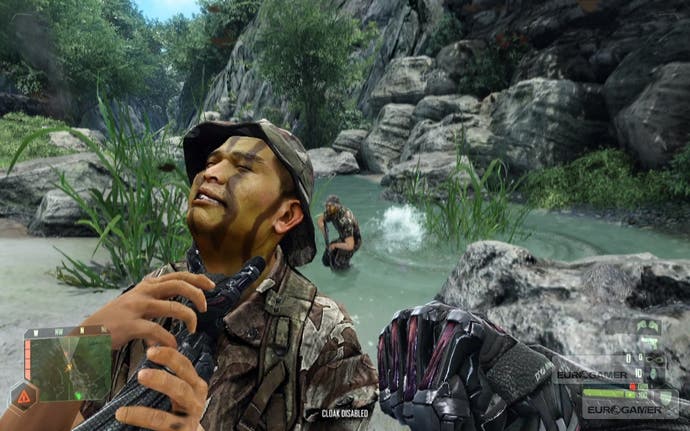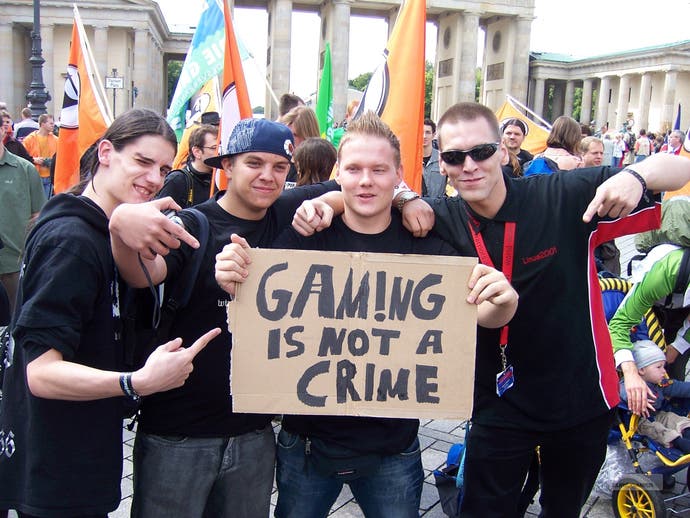Killerspiele
In search of Germany's virtual scapegoats.
Censorship of Fools?
Perhaps it's precisely this sort of under-the-counter practice that gives the videogame industry its unsavoury image in the German social consciousness, all grubby plastic bags filled with unspecified horrors passing quietly from hand to hand. Is it any wonder that the public moves so quickly to pin the blame on these illicit playthings whenever a young person seemingly mimics their violence? More problematically, censorship is illegal in Germany under the fifth article of the constitution. While nobody is prohibiting game developers from making whatever games they want to, surely these strict USK impositions forcing publishers to cut content or be prohibited from publicising their game, is a form of after-the-fact censorship? I put the question to Wolters.
"Neither the indexing of games, nor the confiscating of them represents a censorship. The ban on censorship in Art. 5 of the German Constitution refers to pre-censorship. In other words, a creation cannot be forbidden before it is published. The indexing or the confiscating of games can only be done after they are published and placed on the market. There is no censorship."
Despite this, there are some high-profile voices calling for even more strict impositions against violent videogames in Germany. In June reports were circulated revealing that Germany's 16 Interior Ministers had banded together to ask the Bundestag to ban the production and distribution of violent videogames. I ask Olaf Wolters whether the proposal is mere politicking. "The claim on a general ban on violent games is in first line political activism and is probably not realistic at this time. Firstly, there is no evidence that the existing minor safety policy is inadequate. And of course, a complete ban on games that contain violence would be like a censorship which is incompatible with Article 5 of the German Constitution."

For Cevat Yerli, a Managing Director of Crytek, the German-based developer responsible for games rated 18+, like Crysis, such a ban would represent more than mere inconvenience. It would mean relocating the entire studio to another country, something he has threatened to do publicly in the past in the face of such strong opposition to the sort of games he creates. "No other country discusses this issue with the sort of high intensity that the Germans do," he explains. "When one considers that German law contains some of the strictest protections of minors in the world, not to mention tight restrictions on weaponry, you have to assume that much of the discussion is politically-motivated. I think one reason why Germans use videogames as scapegoat for school shootings more often than other countries, derives from its history in the 20th Century. That's certainly one reason why the debate is a totally different to comparable ones in other countries."
Viva le Resistance?

Of course, as in any democracy there are voices that rally to defend the rights of violent videogames, freely speaking out against what the perceived prejudices have aimed towards them. German parliament ministers Armin Lachet and Andreas Krautscheid are staunch defenders of Germany's current system of videogame classification, and argue publicly that further impositions would be both unnecessary and prejudiced. At a grass roots level too, gamers have rallied together to defend their rights, not only by campaigning against their antagonists, but also, occasionally, by seeking to engage them in conversation.
Peter Schleusser, a 38-year-old construction machine technician from Oberhausen, started a web petition in direct response to the interior ministers' proposals this summer. Within a few short weeks his petition had gathered over 50,000 signatures, a high enough number that Schleusser was invited to the German parliament to debate the issue with politicians. I tracked Schleusser down and asked him how the petition came about.
